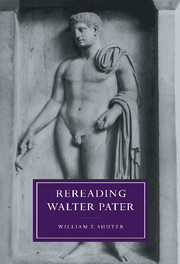Book contents
- Frontmatter
- Contents
- Preface
- Frequently cited sources and abbreviations
- Introduction: an initial reading
- 1 The periegetic critic and the imaginative sense of place
- 2 The retrojective apologist
- 3 Heraclitus, Hegel, and Plato
- 4 The dubious academic
- 5 Visiting the dead
- Conclusion: rereading, revising, and reshuffling
- Notes
- Bibliography
- Index
- Miscellaneous Endmatter
3 - Heraclitus, Hegel, and Plato
Published online by Cambridge University Press: 22 October 2009
- Frontmatter
- Contents
- Preface
- Frequently cited sources and abbreviations
- Introduction: an initial reading
- 1 The periegetic critic and the imaginative sense of place
- 2 The retrojective apologist
- 3 Heraclitus, Hegel, and Plato
- 4 The dubious academic
- 5 Visiting the dead
- Conclusion: rereading, revising, and reshuffling
- Notes
- Bibliography
- Index
- Miscellaneous Endmatter
Summary
Edward Dowden was confident that beneath the succession of philosophic ideas discussed in Plato and Platonism the perceptive reader could discern “something of autobiography.” According to this reading, Pater was presumably thinking of himself when he described Plato as a “Heraclitean in early life,” but as a Heraclitean who became in time a resolute opponent of the philosophy of motion (PP, p. 12). Our initial reading described the history of Pater's philosophical opinions in similar terms. We may therefore begin our rereading of this history with Heraclitus.
But where in fact does a rereading begin? Since it follows upon the end of an earlier reading, a rereading does not, strictly speaking, have a beginning of its own, and the activity of reading and rereading is better represented as a circle than as a pair of parallel lines. Such a paradox of precedence appropriately introduces our subject because nowhere is the distinction between early and late, between anterior and posterior, more uncertain than in the history of Pater's philosophic affinities.
It must certainly be acknowledged that Pater's later discussions of Heraclitus emphasize not only his historically early position but also the youthfulness of the Heraclitean philosophy and, indeed, of Heraclitus himself. In fact, a reader unfamiliar with Aristotle or the usual handbooks might conclude from Pater that Greek philosophy began with Heraclitus. Pater seems to say as much in one of his unpublished manuscripts, and when the eighteen-year-old Marius undertook to retrace “the historic order of human thought,” it was with Heraclitus that he began (MS no. 17, pp. [16v–17r]; ME, 1, 126, 134, 127–128).
- Type
- Chapter
- Information
- Rereading Walter Pater , pp. 61 - 77Publisher: Cambridge University PressPrint publication year: 1997



